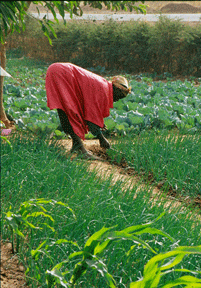
Despite decades of effort and investment in agricultural research for development, the challenges of poverty and hunger persist. There is growing recognition that not integrating gender issues effectively in such efforts might be one reason for this.
Kyte asked workshop participants to reflect on how much global food production would increase, and how many fewer people would go hungry, if female farmers received their fair share.
“Imagine how many more women -- and men -- could lead more productive lives, helping communities and countries to prosper, if women had better access to new technologies and crop varieties,” she added.
The CGIAR is committed to turning these “ifs” into reality, and has a long history of working to ensure that the results of its research benefit and empower rural women. As part of recent reforms, CGIAR has redoubled its efforts, knowing that it will not achieve lasting impact unless it takes gender disparities into account in all aspects of its work.
In her remarks, Kyte emphasized that women need to have greater opportunities not just on the farm, but also in the lab, so that their unique experiences and insights can be shared and brought to bear on agricultural priorities, policies and programs.
